Global Digital Diabetes Management Market - Comprehensive Data-Driven Market Analysis & Strategic Outlook
The global digital diabetes management market will keep reshaping the method in which diabetes care is being sought across the world. Its origin goes back to the early 2000s when traditional glucose monitoring began overlapping its steps with digital technology. Diabetes care initially was heavily reliant upon manual monitoring and frequent doctor visits, but the invention of continuous glucose monitors and smartphones opened a way for more personalized monitoring. By the mid-2010s, the industry started making waves with wearable tech and smartphone connectivity allowing patients to track blood sugar, diet, and activity simultaneously. These innovations transformed patient engagement, turning once-reactive care into a more proactive model.
- Global digital diabetes management market value of approximately USD 14.8 Billion in 2025, at an estimated growth rate of approximately 8.8% until 2032, with scope to exceed USD 26.6 Billion.
- Handheld Devices account for nearly 62.8% market share, driving innovation and raising applications through massive research.
- Principal trends driving growth: Growing prevalence of diabetes across the globe., Growing adoption of digital health products.
- Opportunities include: Integration of artificial intelligence (AI) for personalized diabetes management.
- Key takeaway: The market is set to burst in value in the next decade, showing massive growth prospects.
- Market turning points were when cloud platforms made real-time connection of patients with healthcare professionals possible.
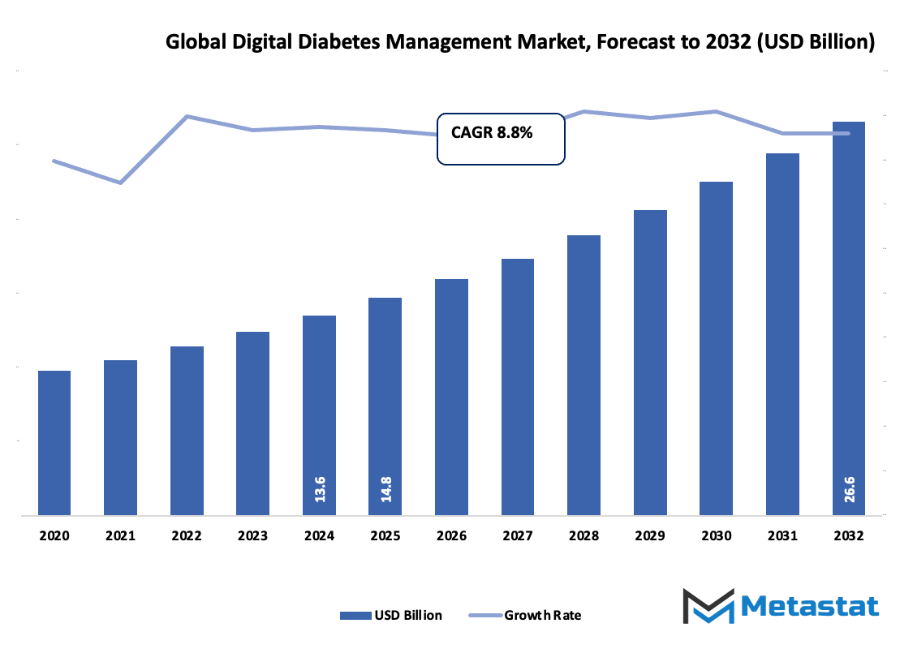
The technology brought instantaneous feedback, adjustment of treatment plans, and prolonged data review. The second turning point was when major regulatory bodies began approving digital health solutions, bringing credibility to the sector and opportunities to a wide range of groups. Integration of artificial intelligence and machine learning will further enhance the capabilities of predictive analytics to identify patterns that can prevent complications from arising. Consumer demands have persistently fueled the market towards solutions that are easy to use, convenient, and non-invasive. Patients increasingly want apps that provide reminders, visualization of data, and seamless integration with other health devices.
So too, healthcare practitioners will adopt digital platforms that improve patient outcomes with the additional advantage of seamless workflow, remote monitoring, and timely intervention. Technological innovation will further accelerate the pace of innovation, ranging from non-invasive glucose sensors to AI-based coaching systems, while regulatory frameworks will evolve to ensure safety and effectiveness without stifling creativity.
Market Segments
The global digital diabetes management market is mainly classified based on Device Type, Product and Service, Type of Diabetes, End User.
By Device Type is further segmented into:
- Handheld Devices: Handheld devices for Global Digital Diabetes Management will deliver portable, easy monitoring solutions. The devices will allow faster blood glucose level measurements and make it easier to have better daily management of diabetes. Future models will feature AI capabilities, predictive warnings, and seamless syncing with other health monitoring devices to improve patient results.
- Wearable Devices: Global Digital Diabetes Management wearable devices will continue to evolve, offering constant monitoring without the need for frequent finger pricks. They will offer real-time analysis of glucose trends, heart rate, and activity level. Advanced wearables will feature connectivity to smartphones, allowing data-driven counsel for lifestyle changes and more personalized diabetes care.
By Product and Service:
- Devices: Digital Diabetes Management Devices will include glucose monitors, insulin pumps, and integrated monitors. Future devices will be founded upon user-friendliness, wireless insulin delivery, and smart integration with health platforms. Breakthroughs will aim to make diabetes care less invasive, accurate, and easy for people of all ages.
- Apps: Digital Diabetes Management Apps will become smarter with trend-based personalized recommendations. Apps will track glucose, diet, and exercise and provide reminders and predictive alerts. Apps in the future will allow users to integrate other healthcare apps and wearable devices with a seamless digital care experience.
- Data Management Software & Platforms: Digital Diabetes management software and platforms will consolidate patient information for simpler analysis. The software and platforms will facilitate monitoring of groups of patients, spotting trends, and forecasting complications. Upcoming platforms will apply AI for the provision of actionable recommendations, improving clinical decision-making along with self-management in patients.
- Services: Digital Diabetes Management services will include remote monitoring, teleconsultation, and personalized coaching. The services will allow patients to access help without physically going to a clinic, enhancing accessibility and convenience. Future services will employ AI and real-time information to render predictive interventions, improving outcomes and reducing the risk of diabetes complications.
By Type of Diabetes:
- Type 1 Diabetes: The global digital diabetes management market for Type 1 diabetes will focus on continuous glucose monitoring, insulin delivery, and predictive analytics. Devices and apps will help manage daily routines and emergency situations. Future solutions will integrate AI to offer personalized care plans, reduce the risk of complications, and improve long-term health outcomes.
- Type 2 Diabetes: The global digital diabetes management market of Type 2 diabetes through Global Digital Diabetes Management will prioritize lifestyle tracking, glucose monitoring, and data-driven guidance. Devices and apps will support adherence to medication and diet plans. Future advancements will emphasize preventive care, early detection of trends, and tailored recommendations to slow disease progression.
- Gestational Diabetes: Digital solutions for gestational diabetes under the global digital diabetes management market will support expectant mothers with monitoring and data tracking. Apps and devices will provide alerts, dietary guidance, and integration with healthcare providers. Future tools will focus on personalized monitoring to ensure the safety of both mother and child during pregnancy.
By End User:
- Self/Home Healthcare: Self and home healthcare will benefit from the global digital diabetes management market that allow daily monitoring and automated alerts. Devices and apps will enable proactive management without frequent clinical visits. Future developments will provide intelligent recommendations and seamless connectivity to health professionals for improved at-home care.
- Hospitals & Specialty Diabetes Clinics: Hospitals and specialty clinics will use the global digital diabetes management market to enhance patient care and streamline monitoring. Integration with electronic medical records and real-time data access will improve treatment decisions. Future tools will allow predictive insights and tailored interventions for both inpatient and outpatient care.
- Academic & Research Institutes: Academic and research institutes will utilize the global digital diabetes management market to study trends, test new interventions, and support clinical trials. Data aggregation and advanced analytics will improve understanding of diabetes patterns. Future research will leverage AI and machine learning to develop innovative treatments and management strategies for all types of diabetes.
|
Forecast Period |
2025-2032 |
|
Market Size in 2025 |
$14.8 Billion |
|
Market Size by 2032 |
$26.6 Billion |
|
Growth Rate from 2025 to 2032 |
8.8% |
|
Base Year |
2024 |
|
Regions Covered |
North America, Europe, Asia-Pacific, South America, Middle East & Africa |
By Region:
- Based on geography, the global digital diabetes management market is divided into North America, Europe, Asia-Pacific, South America, and the Middle East & Africa.
- North America is further divided into the U.S., Canada, and Mexico, whereas Europe consists of the UK, Germany, France, Italy, and the Rest of Europe.
- Asia-Pacific is segmented into India, China, Japan, South Korea, and the Rest of Asia-Pacific.
- The South America region includes Brazil, Argentina, and the Rest of South America, while the Middle East & Africa is categorized into GCC Countries, Egypt, South Africa, and the Rest of the Middle East & Africa.
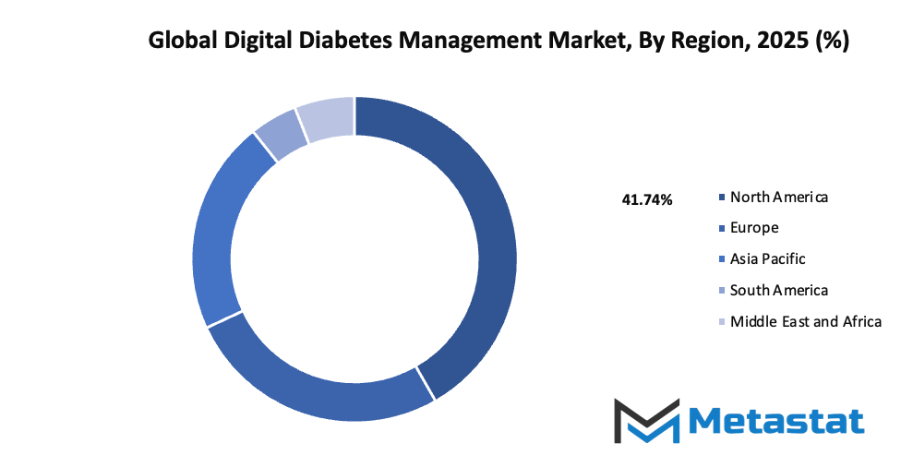
Growth Drivers
- Digital Diabetes Management increasing prevalence of diabetes globally: The number of people affected by diabetes continues to rise around the world, creating an urgent need for better care and monitoring. The global digital diabetes management market will play a vital role in tracking blood sugar levels, medication, and lifestyle patterns, ensuring timely intervention and improved health outcomes for patients everywhere.
- Growing adoption of digital health solutions: Digital tools such as mobile applications, wearable devices, and remote monitoring systems are becoming more widely used. The global digital diabetes management market will benefit from these solutions by offering continuous tracking and guidance, making diabetes care more accessible and efficient. This shift will help healthcare systems respond faster to patient needs.
Challenges and Opportunities
- Data privacy and security concerns: Protecting sensitive health information is critical. The global digital diabetes management market must address risks such as data breaches and unauthorized access. Strong encryption, secure platforms, and strict policies will become essential. Maintaining patient trust will be vital for long-term adoption, allowing individuals to safely benefit from digital diabetes tools.
- Limited access to digital health infrastructure in certain regions: Not all areas have the technology needed for advanced diabetes care. The market may face barriers in regions with poor internet, lack of devices, or limited healthcare resources. Expanding infrastructure and affordable solutions will allow more people to benefit from digital health innovations worldwide.
Opportunities
Integration of artificial intelligence (AI) for personalized diabetes management: Integrating new technologies can transform diabetes care. The global digital diabetes management market will benefit from the use of artificial intelligence, predictive analytics, and personalized guidance. These tools will allow tailored treatment plans, improved monitoring, and proactive health interventions. Future developments will enhance patient outcomes and make diabetes management more precise and efficient.
Competitive Landscape & Strategic Insights
The global digital diabetes management market is shaping the future of healthcare by providing advanced tools and solutions to monitor, manage, and treat diabetes more effectively. With continuous technological progress, the market is set to transform the way patients interact with their care, offering not only convenience but also improved health outcomes. This market includes a combination of well-established international companies and emerging regional players, which fuels competition and innovation. Companies such as B. Braun Melsungen AG, Medtronic, Dexcom, Inc., Livongo Health, Abbott Laboratories, F. Hoffmann-La Roche Ltd, Tandem Diabetes Care, ACON Laboratories, Inc., Glooko, Inc., Ascensia Diabetes Care Holdings AG, LifeScan, Inc., AgaMatrix, DarioHealth Corporation, Ypsomed Holding AG, ARKRAY Healthcare Private Limited, Emperra GmbH E-Health Technologies, Pendiq GmbH, BeatO, and Novo Nordisk A/S provide a diverse range of devices, software solutions, and digital services that improve patient monitoring, enhance treatment plans, and support better lifestyle management for people with diabetes.
The market is expected to expand rapidly as wearable devices, mobile applications, and cloud-based platforms become more integrated into daily healthcare routines. Future developments will likely focus on artificial intelligence and predictive analytics to provide personalized recommendations, helping healthcare providers anticipate complications before they occur. Remote monitoring and telehealth services will become increasingly common, allowing continuous tracking of glucose levels, medication adherence, and overall health patterns, which will reduce hospital visits and improve quality of life for patients.
Investment in research and development will continue to drive innovation, leading to more efficient, user-friendly, and accessible solutions. This will create opportunities for new entrants while challenging existing companies to continuously enhance their offerings. Collaboration between technology developers and healthcare professionals will strengthen the market, ensuring that devices and applications not only collect data but also provide actionable insights for better disease management. With these advancements, the market is positioned to make diabetes care more proactive, precise, and personalized, offering hope for better long-term outcomes and transforming the healthcare experience for millions of people worldwide.
The The global digital diabetes management market is expected to grow significantly as digital solutions become more integrated into daily healthcare routines. Innovations in continuous glucose monitoring, connected insulin pens, and mobile applications allow real-time data sharing between patients and healthcare providers. These technologies will improve adherence to treatment plans, reduce complications, and provide better overall disease management. Emerging regional competitors are also contributing to this growth by introducing cost-effective solutions and localized platforms tailored to specific populations, enhancing accessibility in developing regions.
The increasing adoption of cloud-based platforms, artificial intelligence, and data analytics in the global digital diabetes management market will reshape how healthcare providers analyze patient information and create personalized treatment strategies. Real-time monitoring and predictive algorithms will enable proactive interventions, reducing hospital visits and improving quality of life for patients. Partnerships and collaborations between technology developers and healthcare institutions will further accelerate innovation, ensuring that solutions remain user-friendly and clinically effective.
Looking forward, the global digital diabetes management market will likely expand into areas such as remote patient monitoring, telehealth integration, and wearable devices, offering seamless and continuous care. Regulatory support and growing awareness of digital health benefits will encourage further investment in this sector. Companies will continue to focus on enhancing interoperability, security, and patient engagement, ensuring that the next generation of diabetes management tools is more effective, convenient, and widely accessible.
The combination of established industry leaders and emerging players positions the market for sustained growth. Technological innovation, strategic collaborations, and increasing patient demand will continue to shape this market, making digital solutions a fundamental part of modern diabetes care.
Market size is forecast to rise from USD 14.8 Billion in 2025 to over USD 26.6 Billion by 2032. Digital Diabetes Management will maintain dominance but face growing competition from emerging formats.
Looking ahead, the global digital diabetes management market will expand its role in personalized healthcare. By harnessing data, enhancing connectivity, and addressing patient expectations, the market will redefine diabetes care on a global scale. Each new device and platform will bring the industry closer to making diabetes management less burdensome, more precise, and universally accessible, shaping a future where digital solutions are an integral part of everyday health routines.
Report Coverage
This research report categorizes the global digital diabetes management market based on various segments and regions, forecasts revenue growth, and analyzes trends in each submarket. The report analyses the key growth drivers, opportunities, and challenges influencing market. Recent market developments and competitive strategies such as expansion, type launch, development, partnership, merger, and acquisition have been included to draw the competitive landscape in the market. The report strategically identifies and profiles the key market players and analyses their core competencies in each sub-segment of the global digital diabetes management market.
Digital Diabetes Management Market Key Segments:
By Device Type
- Handheld Devices
- Wearable Devices
By Product and Service
- Devices
- Apps
- Data Management Software & Platforms
- Services
By Type of Diabetes
- Type 1 diabetes
- Type 1 diabetes
- Gestational Diabetes
By End User
- Self/Home Healthcare
- Hospitals & Specialty Diabetes Clinics
- Academic & Research Institutes
Key Global Digital Diabetes Management Industry Players
- B. Braun Melsungen AG
- Medtronic
- Dexcom, Inc.
- Livongo Health
- Abbott Laboratories
- F. Hoffmann-La Roche Ltd
- Tandem Diabetes Care
- ACON Laboratories, Inc.
- Glooko, Inc.
- Ascensia Diabetes Care Holdings AG
- LifeScan, Inc.
- AgaMatrix
- DarioHealth Corporation
- Ypsomed Holding AG
- ARKRAY Healthcare Private Limited
- Emperra GmbH E-Health Technologies
- LifeScan, Inc
- Pendiq GmbH
- BeatO
- Novo Nordisk A/S
WHAT REPORT PROVIDES
- Full in-depth analysis of the parent Industry
- Important changes in market and its dynamics
- Segmentation details of the market
- Former, on-going, and projected market analysis in terms of volume and value
- Assessment of niche industry developments
- Market share analysis
- Key strategies of major players
- Emerging segments and regional growth potential



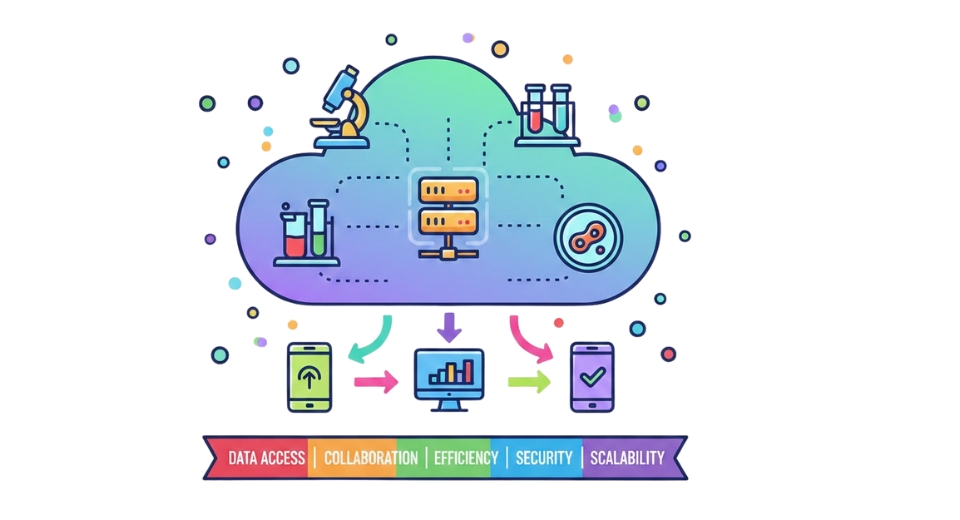
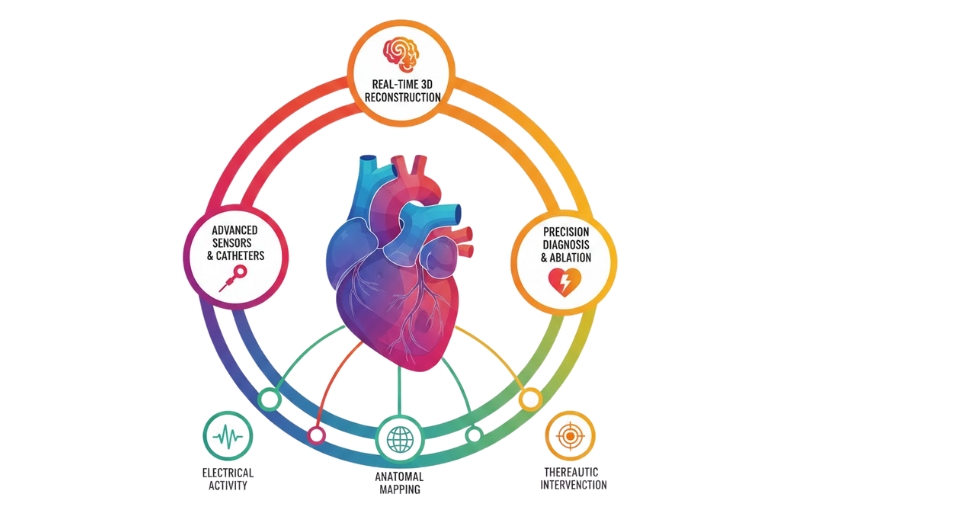
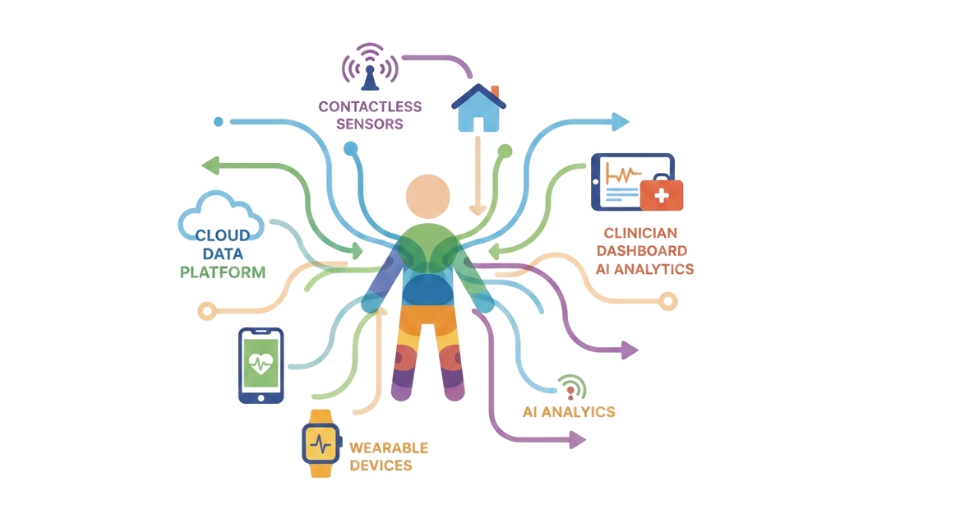
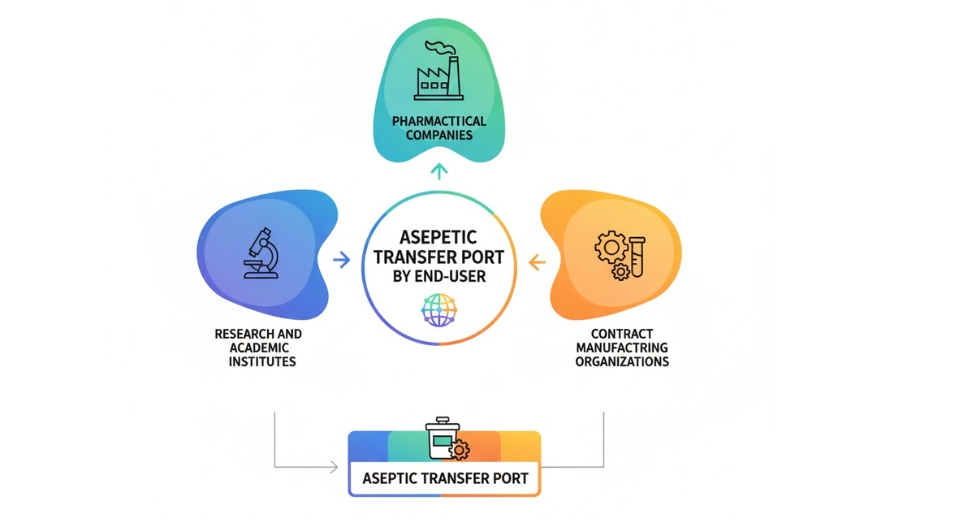

 US: +1 3023308252
US: +1 3023308252






